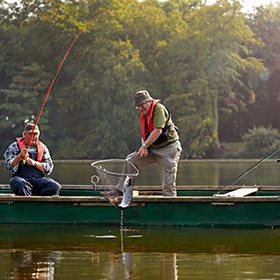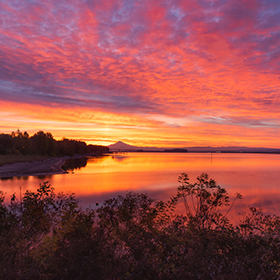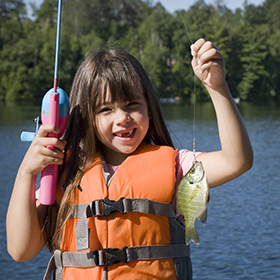The common carp is so widely distributed we often forget it is a non-native species. Good luck finding a lake or river without these bottom-dwelling fish wallowing it. In many bodies of water, carp make up a majority of the fish biomass.
The common carp is so widely distributed we often forget it is a non-native species. Good luck finding a lake or river without these bottom-dwelling fish wallowing it. In many bodies of water, carp make up a majority of the fish biomass.
Though highly-prized in their native Europe, the common carp makes many anglers in the U.S. grumpy. Research has shown carp to be detrimental to native fish populations and even waterfowl and game by constantly stirring up bottom sediment.
But there also are anglers that love carp. Andy Sutthoff, “Terminal Angler, Fly Tier, and Fly Casting Instructor,” is one such fly fisherman in Ohio.
“Carp embody everything that I love about a true game fish,” he wrote. The “golden ghosts,” as he calls them, are “big, strong, smart, and wary. One minute you’ll see the fish tailing or feeding in the shallow flats and the next minute it’s gone, obviously detecting your presence or some danger attributed to you.”
Carp have a reputation of being boney and strong flavored so rarely harvested, at least in the U.S. In fact, there is an old joke about eating the “plank” that it was cooked on instead of the fish. But when I asked Sutthoff about palatability being a reason carp are underutilized he laughed.
“Some swear how delicious the carp flesh is when prepared right,” but added, “I have no intention to find out.” : -)
When I think of urban fishing, I think of carp. Tolerant of poor water quality and high temperatures, they are found in places other fish can’t survive. They are here to stay. And, overlooked by most anglers. Why not try to catch a carp?
Though highly-prized in their native Europe, the common carp makes many anglers in the U.S. grumpy. Research has shown carp to be detrimental to native fish populations and even waterfowl and game by constantly stirring up bottom sediment.
But there also are anglers that love carp. Andy Sutthoff, “Terminal Angler, Fly Tier, and Fly Casting Instructor,” is one such fly fisherman in Ohio.
“Carp embody everything that I love about a true game fish,” he wrote. The “golden ghosts,” as he calls them, are “big, strong, smart, and wary. One minute you’ll see the fish tailing or feeding in the shallow flats and the next minute it’s gone, obviously detecting your presence or some danger attributed to you.”
Carp have a reputation of being boney and strong flavored so rarely harvested, at least in the U.S. In fact, there is an old joke about eating the “plank” that it was cooked on instead of the fish. But when I asked Sutthoff about palatability being a reason carp are underutilized he laughed.
“Some swear how delicious the carp flesh is when prepared right,” but added, “I have no intention to find out.” : -)
When I think of urban fishing, I think of carp. Tolerant of poor water quality and high temperatures, they are found in places other fish can’t survive. They are here to stay. And, overlooked by most anglers. Why not try to catch a carp?









